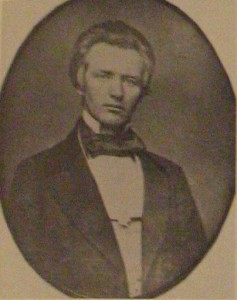From The New-York Times January 4, 1861:
MEETING OF THE MISSOURI LEGISLATURE.; MESSAGE OF GOV. STEWART SECESSION DENOUNCED.
ST. LOUIS, Thursday, Jan. 3.
Gov. STEWART’s message was read to the Legislature to-day.
After reviewing the progress of the Abolition and Republican Parties, and stating the result of their success, the Governor says that Missouri occupies a position in regard to these troubles that should make her voice potent in the councils of the nation. With scarcely a Disunionist per se within her borders, she is still determined to demand and maintain her rights at every hazard.
Missouri loves the Union, and will never submit to wrong. She came into the Union upon a compromise, and is willing to abide by a fair compromise — not such ephemeral contracts as are enacted by Congress to-day and repealed to-morrow, but a compromise assuring all the just rights of the States, and agreed to in solemn convention of all the parties interested.
Missouri has a right to speak on this subject, because she has suffered deeply, having, probably, lost as much in the past few years by abductions of slaves as all the rest of the Southern States put together.
Speaking of secession, the Governor deprecates the action of South Carolina, and says: “Our people would feel more sympathy with the movement, had it originated amongst those who, like ourselves, have suffered severe losses and constant annoyances from the interference and depredations of outsiders.”
Missouri will hold to the Union so long as it is worth the effort to preserve it. She cannot be frightened by the past unfriendly legislation of the North, or dragooned into secession by the restrictive legislation of the extreme South. The Governor denies the right of voluntary secession, and says that it would be utterly destructive of every principle on which the national faith is founded; appeals to the great conservative masses of the people to put down selfish and designing politicians, to avert the threatened evils, and closes with a strong recommendation to adopt all proper measures for our rights; condemns the resort to separation; protests against hasty and unwise action, and records his unalterable devotion to the Union, so long as it can be made the protector of equal rights.
The Governor then passes to state matters and shows the finances to be in a prosperous condition; recommends a revision of the military laws; advises arming the militia; proposes protection against invasion; refers to the condition of different railroads, and recommends the Legislature to relieve the banks from the penalties incurred by temporary suspensions of specie payment.
Governor Robert Marcellus Stewart would leave office in January 1861.
Scarcely a disunionist in the state? Seven Score and Ten reported on the 1860 presidential campaign in Missouri. The state’s electoral vote was won by Douglas, but Breckinridge did pick up 30% of the popular vote.

